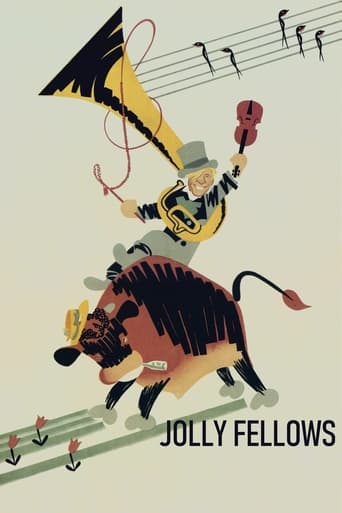hahnerpeter
I don"t understand the users who have written these reviews. This film is idiotic, amateurish and mendacious. Look at that those first ten minutes! Those rich and happy peasants! It was made in the years after the time when the entire country was hit by epidemics and famine. Millions died and suffered.from mass repression. According to this film this was the time of happy peasants and funny musicals. So the word "lovely" sounds a bit weird.
Armand
music, acting, humor, message, image. it is more than a comedy. or music hall. it is a travel in time. not for its venerable age but for its time. because, in dark period of Stalinism, this demonstration of pure joy, this manifesto of profound freedom is unique. sure, not extraordinary script and the waves of songs are essential virtue. but it remains special. for the gorgeous naivety with flavor of childhood adventure. for memorable scenes. for the impressive demonstration of animal tights. for drops of love and, sure, for extraordinary voices. and, at first sigh, it is enough. but, after each new view, it is different. out of charming atmosphere it is strange tension. and testimony of a form, subtle, delicate, special of courage. because it is one of films - letter for future.
Andrei Pavlov
It is a highly musical film completely devoid of any depression and political propaganda. Such films help us to get a close look at ourselves and to understand how lazy we all are nowadays ("we are a lazy generation" - remember "Burnout 3: Takedown"?). Look at today's musical films - they cannot keep the pace with this old comedy. The film was restored in 1978 (if I remember it correctly) and the version I've watched is pretty good. During singing the movement of the actors' lips and the sound of the voice are not always matching each other but that's not important. The quality of the sound is very satisfactory and lets the viewer hear wonderful voices of our best 20th century actors in their full glory.Among the numerous funny scenes I would like to point out the following "signature moves" which really attracted my attention:1) the camera's glide along the bodies of sunbathing holidaymakers (feet, backs, buttocks, feet, feet, backs, etc.) - that's something I've never seen in a movie; 2) the "beat-'em-all" sequence: the ultimate "disassembly" of the whole band (instruments included) - that's something even Mr Jacky Chan has to watch closely and admire; 3) "the raining race": the guys from the band "Merry Fellows" are riding a catafalque to get to the theatre and this race looks simply insane.Together with "Volga - Volga" (1938) it is a brilliant example of our best musical comedies. If you should call some classics of this genre "cult", then don't forget "Vesyolye rebyata" (1934). It is one of those examples when you can easily skip the imperfections and enjoy the whole piece.Mr Leonid Utyosov gives, quite possibly, his best performance and Mrs Lyubov Orlova shines again. When I have more time and inclination, I shall add more details to my comment. Meanwhile, 10 out of 10. Thank you for attention.
barnesgene
This first Soviet musical comedy on film still shows signs of silent era mentality, mainly because the sound is so poorly coordinated with the picture, as if it were an afterthought, but also because the gags are predominantly visual. You'll wince at many of the shots too, especially those close-ups of the actors delivering each single line -- it's hard to be subtle when the camera's 18 inches from your face. Also obvious is the political subtext -- a jolly peasant demolishes the upper crust's airs and way of life. It's interesting that, in this as in many Soviet films that try to be light-hearted, food and drink fairly tumble off the screen, as if to feed those in abject poverty who have come to watch it.For all that, the director, Grigori Aleksandrov, challenged himself and his crew with some awesomely complex shoots. The opening scene of the shepherd marching his animals out of the pen and through the farmland, past peasants and workers, is quite lengthy, but only involves four takes spliced subtly together. (Oh, but would the sound have matched better!) Similarly, the would-be female singer strolls down the beach past a cornucopia of beach activity, some in the extreme foreground, some mid-field, some in the back behind her. It's one long take, and yet it manages to be interesting and funny at times, and it even manages to set up a later gag while it's at it.And the music: It's jazz from the acoustic era, with tubas providing the bass line, pretty quaint and good-timey. But about half of the music in the soundtrack is full orchestral material composed by Isaak Dunayevsky, with a rousing salute to the simple peasant life getting a full-blown treatment both at the beginning and the end of the picture, the equivalent of Socialist Realism for music. It's a great little melody you can whistle on the way home as you wonder where your next meal will come from.



